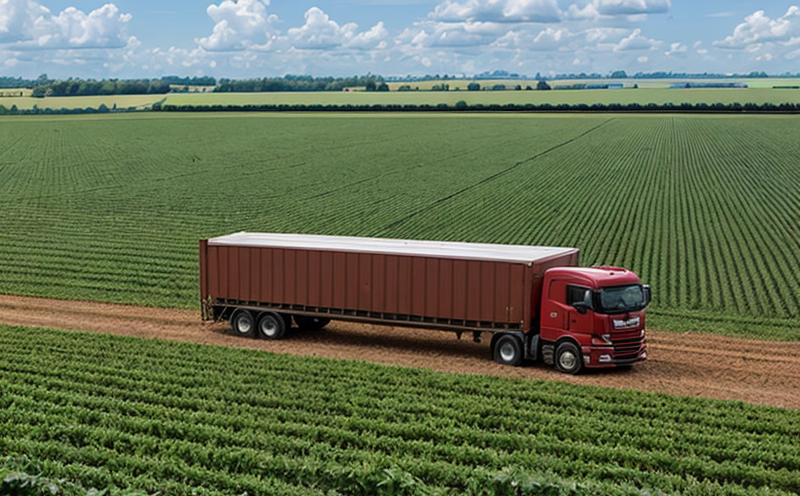Compression Strength Testing of Corrugated Boxes
The compression strength testing of corrugated boxes is a critical process in ensuring that packaging used within agriculture and forestry sectors meets the necessary standards for protecting goods during transport. This test evaluates how well the box can withstand compressive forces without collapsing, which is essential to prevent damage to agricultural products such as fruits, vegetables, grains, and timber.
Corrugated boxes are widely used in the packaging of agricultural goods due to their ability to provide cushioning and protection against external impacts. The design of corrugated cardboard involves alternating layers of fluted paper that form a honeycomb structure, which offers excellent strength-to-weight ratio properties. This makes them an ideal choice for protecting delicate agricultural products during transport.
In the context of agriculture and forestry testing, the primary focus is on ensuring that packaging not only protects goods but also complies with international standards such as ISO 7246-1. The test aims to determine the maximum compressive load a box can withstand before it collapses or deforms significantly.
The compression strength test involves placing a corrugated box containing simulated agricultural products on a testing machine that gradually applies pressure until failure occurs. The testing machine typically uses hydraulic or pneumatic systems capable of applying controlled loads incrementally, allowing for precise measurement of the point at which the box fails under load.
Specimen preparation is crucial in this process. For accurate results, the corrugated box must be filled with a representative sample that simulates typical agricultural goods in terms of weight and volume distribution. This ensures that the test reflects real-world conditions as closely as possible. Once prepared, the box is placed on the compression testing machine.
The test procedure involves applying pressure to the top surface of the box at a controlled rate until it fails. The load at which failure occurs is recorded and compared against specified standards or contractual agreements. This data helps determine if the packaging meets the required strength criteria for protecting agricultural goods during transportation.
Understanding the testing parameters is essential for quality managers, compliance officers, R&D engineers, and procurement professionals involved in selecting suitable packaging solutions. By adhering to international standards like ISO 7246-1, organizations can ensure their products meet global expectations while minimizing risks associated with improper packaging.
It's important to note that the correct specimen preparation plays a significant role in achieving accurate results during compression strength testing. Filling the box uniformly and ensuring it represents actual product loads helps eliminate variables affecting test outcomes. Proper calibration of equipment also ensures consistent and reliable measurements across different tests.
The result from this type of testing provides valuable insights into the effectiveness of corrugated packaging designed for agricultural goods transport. Compliance with international standards not only enhances product quality but also contributes to reducing waste by optimizing box usage according to actual load requirements.
Furthermore, understanding industry trends and best practices surrounding compression strength testing allows stakeholders in agriculture and forestry sectors to make informed decisions about their packaging choices. By leveraging these insights, they can enhance the overall efficiency of supply chains while ensuring product integrity throughout transportation processes.
Industry Applications
| Application Area | Description |
|---|---|
| Fruits & Vegetables | Ensuring that boxes used to transport fruits and vegetables can withstand the rigors of long-distance travel without damaging contents. |
| Cereals & Grains | Evaluating the strength of packaging designed for cereals and grains to protect them from pressure during shipment. |
| Timber Products | Determining the compressive capacity of boxes used in transporting timber products safely across various terrains. |
| Poultry & Livestock | Guaranteeing that packaging used for transporting livestock feed and bedding is robust enough to maintain integrity during transit. |
Eurolab Advantages
Eurolab offers comprehensive compression strength testing services tailored specifically for corrugated boxes used in agriculture and forestry. Our state-of-the-art facilities equipped with advanced testing machines ensure precise measurements under controlled environmental conditions, providing reliable results every time.
Our expert team of technicians ensures that each specimen is prepared accurately according to industry best practices, ensuring consistent and repeatable test outcomes. This attention to detail allows us to deliver accurate assessments that meet international standards such as ISO 7246-1.
We pride ourselves on offering quick turnaround times without compromising the quality of our services. By leveraging our extensive experience in agricultural and forestry testing, we provide customized solutions that address unique challenges faced by our clients.
Our commitment to excellence is reflected in the high level of customer satisfaction achieved through transparent communication throughout the testing process. Whether you're looking for routine compliance checks or one-off assessments, Eurolab delivers reliable results consistently.
International Acceptance and Recognition
Eurolab's compression strength testing services are internationally recognized and accepted by regulatory bodies worldwide. We adhere strictly to global standards such as ISO 7246-1, ensuring that our results are valid and credible.
The widespread adoption of these tests underscores their importance in maintaining quality control within the agriculture and forestry sectors. By adhering to international norms, we help ensure consistent performance across different regions, fostering trust among stakeholders involved in global supply chains.
Our rigorous adherence to international standards also enhances our reputation as a leading provider of agricultural testing services. This recognition translates into increased business opportunities for organizations seeking reliable partners who understand the nuances of protecting perishable goods during transport.
The acceptance and validation by various countries and regulatory agencies further reinforce Eurolab's position as a trusted partner in ensuring product integrity throughout transportation processes. Our commitment to excellence continues to set us apart from competitors, providing peace of mind for those investing in our services.





